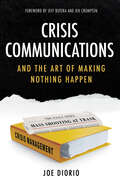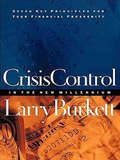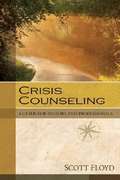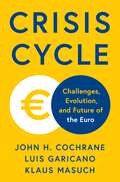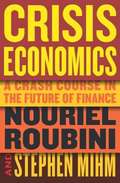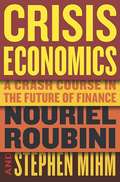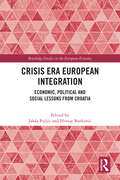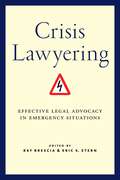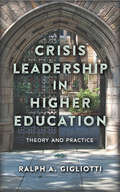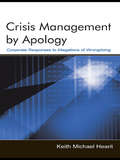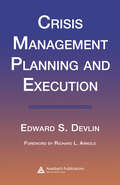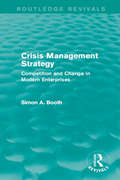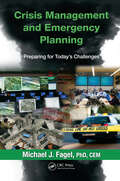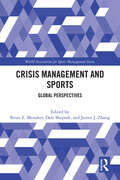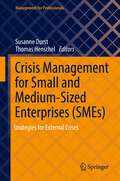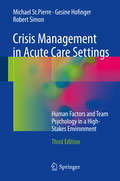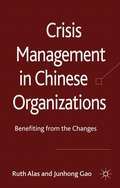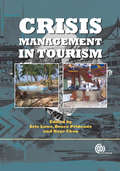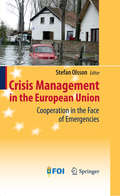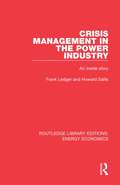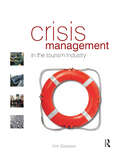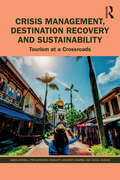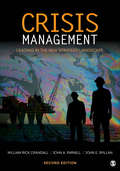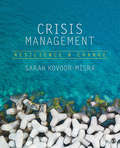- Table View
- List View
Crisis Communications: and the Art of Making Nothing Happen
by Joseph J. DiorioCrises happen. But how they are handled makes all the difference in the world.It's 2019. A gunman enters Trask International, a suburban Washington, D.C. office, leaving three people dead and dozens injured. One of the biggest differences between this tragedy and \the many others that have unfortunately occurred recently? They were ready for this. Trask International had a comprehensive Crisis Communications plan.No, the plan didn't deploy bulletproof shields, nor did it call upon a secret superhero to fight off the gunman. But the plan did spell out how the business should respond in public to what happened, keep the focus on the true victims and not position the business as one, and how the business could—and would—get things back to normal as quickly as possible.Crisis Communications and the Art of Making Nothing Happen is a fast-paced story told in two parts—the first tells the tale of the shooting itself, while the second presents a deep dive into how a business prepares for a crisis. It takes a close look at the teamwork involved with crisis communication planning, and, ultimately, how preparation helps keep a bad situation from getting worse.
Crisis Control For 2000 and Beyond: Boom or Bust?
by Larry BurkettBest-selling author, Larry Burkett, looks at Y2K and the growing world-wide economic instability and gives his evaluation. Will it be a boom or a bust economy? Either way, the seven basic principles he shares will provide God's wisdom to investors of all ages and incomes.
Crisis Counseling: A Guide for Pastors and Professionals
by Scott FloydDr. Floyd helps readers understand the nature of crises events, how individuals are impacted, and how to best provide help during and following times of trauma, loss, and grief.
Crisis Cycle: Challenges, Evolution, and Future of the Euro
by John H. Cochrane Klaus Masuch Luis GaricanoHow the euro survived a series of crises, and how to make it more resilientThe euro has survived crises unimagined at its founding: the financial meltdown of 2007–2009, the sovereign debt crisis of 2010–2012, the pandemic, and the Russian invasion of Ukraine. The European Central Bank fought these crises with dramatic policy innovations, buying up vast amounts of debt and providing large loans to banks. But now everyone expects the ECB to intervene routinely, and the euro is more fragile as a result. Crisis Cycle recounts this history and offers recommendations for restoring a durable monetary union.Monetary and fiscal policy are intertwined, especially in a currency union like the eurozone. Member states can be tempted to borrow and spend too much, and then count on the ECB to rescue them by printing money to buy their bonds. To avoid these disincentives, the ECB was founded with a narrow mandate: use interest rates to pursue price stability, and don&’t buy sovereign debt. Debt and deficit rules would keep countries from getting into trouble.The ECB&’s emergency innovations brought back these disincentives. How can the EU avoid larger and larger bailouts? The authors argue that Europe needs a joint fiscal institution that can provide temporary help to sovereigns, a resolution mechanism so sovereign default is a motivating possibility, and bank reform that ensures sovereign default will not bring down the financial system. This timely book shows how to restore the euro&’s ambitious and effective founding framework. The unique group of authors combine extensive policy experience and authoritative academic credentials.
Crisis Economics: A Crash Course in the Future of Finance
by stephen Roubini Nouriel MihmOne man saw it coming. As far back as 2005, Professor Nouriel Roubini – aka 'Dr Doom' – warned that the US housing bubble was set to crash, and what would begin as a national disease would soon spread overseas resulting in a deep recession. Free market fundamentalism would fail and we'd be faced with the worst economic crisis in history, crippling our global economy and bringing the world's financial systems to a shuddering halt. Sound familiar? By guiding us through a crash course in 'crisis economics' – black swans and white swans, pressure points in the global economy, crises that extend beyond national borders and bubbles in the financial sector that spill over into the real economy – Roubini shows us that boom to bust economics does not have to be destiny. Roubini offers a course for the future: radical reform of the international financial order and a clear view of regulation, supervision and greater coordination between central banks in Europe, Asia and the United States.
Crisis Economics: A Crash Course in the Future of Finance
by Stephen Mihm Nouriel RoubiniThis myth-shattering book reveals the methods Roubini used to foretell the current crisis before other economists saw it coming and shows how those methods can help to make sense of the present and prepare for the future.
Crisis Era European Integration: Economic, Political and Social Lessons from Croatia (Routledge Studies in the European Economy)
by Jakša Puljiz Hrvoje ButkovićThe year 2023 marked the tenth anniversary of Croatia’s membership of the European Union, the last acceding country to the EU, and thus represents a fitting opportunity to explore the political, economic and social dimensions of this tremendous transformation. This book examines how Croatia has changed over the last ten years and looks at the driving forces as well as the obstacles on its post-accession path of Europeanisation.The book argues that the Croatian case has special importance given that the last decade of European integration has arguably been the most challenging one yet. It started with the Eurozone-wide sovereign debt crisis and ended with the economic hardship caused by the COVID-19 pandemic and Russia’s aggression on Ukraine. Such demanding circumstances where agenda was often defined in an ad hoc way posed a huge test for Croatia’s governmental capacity. The book provides answers to the question of how successful Croatian policymakers were in dealing with the crises-related challanges and other needed adaptations. The book explores how EU membership has affected the design and implementation of selected national public policies, the functioning of governing institutions and patterns of cooperation between main social actors. Expert contributors analyse the impact of the EU membership in two principal areas: political and economic, with individual chapters addressing relevant topics.The book is intended for researchers, academics and students interested in these issues, as well as policymakers, entrepreneurs and lobbyists concerned with European integration.
Crisis Lawyering: Effective Legal Advocacy in Emergency Situations
by Eric K. Stern Ray BresciaShines a light on the emerging field of law dedicated to responding to and resolving the crises of the twenty-first centuryIn an increasingly globalized world, a complex and interlocking web of nations, governments, non-state actors, laws, and rules affect human behavior. When crisis hits—whether that be extrajudicial detention, unprompted deportation, pandemics, or natural disasters—lawyers are increasingly among the first responders, equipped with the knowledge necessary to navigate the regulations of this ever more complex world.Crisis Lawyering explores this phenomenon and attempts to identify and define what it means to engage in the practice of law in crisis situations. In so doing, it hopes to sketch out the contours of the emerging field of crisis lawyering. Contributors to this volume explore cases surrounding domestic violence; dealing with immigrants in detention and banned from travel; policing in Ferguson, Missouri; the kidnapping of journalists; and climate change, among other crises. Their analysis not only serves as guidance to lawyers in such situations, but also helps others who deal with crises understand those crises—and the role of lawyers in them—better so that they may respond to them more effectively, efficiently, collaboratively and creatively. Crisis Lawyering shines a light on the emerging field of law dedicated to responding to and resolving the complex crises of the twenty-first century.
Crisis Leadership in Higher Education: Theory and Practice
by Ralph A GigliottiThere was a time when crises on college and university campuses were relatively rare. Much has changed, and it has changed quite rapidly. Rather than being isolated incidents requiring the sole attention of presidents, chancellors, or communication professionals, the proliferation of crises across campuses means that crisis leadership has now become fundamental to the work of university personnel across levels, disciplines, and institutions. Drawing upon the findings of forty interviews with senior leaders from ten major research universities across the United States and a content analysis of over one thousand articles from a variety of news outlets, Crisis Leadership in Higher Education presents a theory-informed framework for academic and administrative leaders who must navigate the institutional and environmental crises that are most germane to institutions of higher education. The perspectives offered in this book remind us that it is in the chaos and uncertainty of crisis that leadership becomes most visible and most critical.
Crisis Management By Apology: Corporate Response to Allegations of Wrongdoing (Routledge Communication Series)
by Keith Michael HearitThis volume examines the role of apologia and apology in response to public attack. Author Keith Michael Hearit provides an introduction to these common components of public life, and considers a diverse list of subjects, from public figures and individuals to corporations and institutions. He explores the motivations and rationales behind apologies, and considers the ethics and legal liabilities of these actions. Hearit provides case studies throughout the volume, with many familiar examples from recent events in the United States, as well as an international apology-making case from Japan.The broad-perspective approach of this volume makes the content relevant and appealing to practitioners and scholars in public relations, business communications, and management. It is a valuable text for courses that take a discursive approach to public relations, and it also appeals to readers in business management, examining apology as a response strategy to corporate crises.
Crisis Management Planning and Execution
by Edward S. DevlinCrisis management planning refers to the methodology used by executives to respond to and manage a crisis and is an integral part of a business resumption plan. Crisis Management Planning and Execution explores in detail the concepts of crisis management planning, which involves a number of crises other than physical disaster.Defining th
Crisis Management Strategy: Competition and Change in Modern Enterprises (Routledge Revivals)
by Simon A. BoothCrisis Management Strategy, first published in 1993, is an excellent introduction to the theory and practice of crisis management in modern enterprises. Simon Booth examines the conventional approaches followed by many firms in the face of change and crisis. He warns of the dangers of theories which oversimplify the causes of crisis and their possible solutions, and which overlook the individual nature of each firm and its environment. Instead, a dynamic new vision of crisis management is offered, which takes into account different kinds of crisis demanding diverse solutions. The key role of leadership is also evaluated in relation to both internally and externally generated crises. Drawing on case studies of leading firms facing crisis solutions in a variety of environments, this truly international volume will provide valuable insight into the experience of crisis, risk and uncertainty. This title will be of interest to students of business.
Crisis Management and Emergency Planning: Preparing for Today's Challenges
by Michael J. FagelEmergency managers and officials have seen a tremendous increase in the planning responsibilities placed on their shoulders over the last decade. Crisis Management and Emergency Planning: Preparing for Today's Challenges supplies time-tested insights to help communities and organizations become better prepared to cope with natural and manmade disas
Crisis Management and Sports: Global Perspectives (World Association for Sport Management Series)
by James J. Zhang Brian E. Menaker Dale SheptakIn an increasingly turbulent, insecure and fast-changing world, this book presents case studies of crisis management that help the reader to understand what best practice looks like and how to guide sport organizations through the crises that are an inevitable aspect of commercial life.Featuring the work of leading researchers from ten different countries, and drawing on work in sport management, sport communication and socio-cultural sport studies, the book includes cases from around the world. It explores important themes in contemporary sport management, including resilience in sport organizations; the use of technology in crisis communication; the socio-cultural dimensions of crisis management; reputation and image management; policing and security; and the management of sports events. It also offers examples from a wide range of different sports, including tennis, golf, soccer, gymnastics, mountaineering, rugby, distance running, and the Olympic Games.This book is an essential addition to the library of anybody with an interest in sport business and management, event management, crisis communication, or public relations.
Crisis Management for Small and Medium-Sized Enterprises: Strategies for External Crises (Management for Professionals)
by Susanne Durst Thomas HenschelThis book provides an in-depth introduction to crisis management and leadership in SMEs, as well as methods, approaches and cases against the background of different crises; external ones in particular. Featuring contributions from research and practice, this book covers a plethora of SMEs from different sectors to match the diverse nature of small business practice. The combination of a sound theoretical framework for small firm crisis management along with practical instruments/methods and cases, help to improve the organizational resilience of SMEs. The authors also guide the reader to resources beyond the book, including an online “Crisis Toolkit” comprised of material such as further publications, crisis management blueprints, guidelines, checklists, and company cases on crisis management-related issues.
Crisis Management in Acute Care Settings: Human Factors and Team Psychology in a High-Stakes Environment
by Gesine Hofinger Michael St. Pierre Robert SimonThis book is unique in providing a comprehensive overview of the human factors issues relevant to patient safety during acute care. By elucidating the principles of human behavior and decision-making in critical situations and identifying frequent sources of human error, it will help healthcare professionals provide safer, more effective treatment when dealing with emergencies characterized by uncertainty, high stakes, time pressure, and stress. The third edition has emerged from an ongoing synergistic relationship between clinicians and behavioral scientists on both sides of the Atlantic to update and enhance each chapter -- blending the strengths of the two professions into a readily accessible text. Among other improvements, readers will find sharper articulation of concepts and significantly more information on the organizational impact on individual and team performance. Crisis Management in Acute Care Settings is the required reference for all who are learning about, teaching, or providing acute and emergency healthcare. It will be of high value for undergraduate and graduate medical and nursing program and offer a much-needed resource for those who use high-fidelity healthcare simulation to teach teamwork.
Crisis Management in Chinese Organizations
by Ruth Alas Junhong GaoA theoretical framework on how to manage crises in Chinese organizations. The authors connect crisis management theories with practical examples from Chinese companies tohelp deepen the understanding of Chinese work culture and practices. The authors believe that this volume may contribute to better crisis management not only in Chinese organizations, but also in organizations from other countries. Learning from mistakes and from the positive solutions to such situations could be the key to future success. Improvement in the management of critical situations in organizations could lead to improvements in the economy as a whole.
Crisis Management in Tourism
by Bruce Prideaux Eric Laws Kaye ChonThe history of modern tourism records many localized and some international crises characterized by extreme and sudden reduction in demand for specific destination areas or types of tourism product. Managerial responses to such events include both problem solving and market recovery steps, but these vary in effectiveness and recovery may be slow to occur after the initial problems are overcome. With examples drawn from the UK, Europe, America, Australia and Asia, this book brings together a range of expert academic analysis of the latest thinking and practice in this increasingly important area of tourism management.
Crisis Management in the European Union: Cooperation in the Face of Emergencies
by Stefan OlssonIn less than a decade, Europe has witnessed a series of large-scale natural disasters and two major terrorist attacks. Growing concern about the trans-national effects of these incidents has caused the EU Member States to seek more multilateral cooperation. As a result, a system of common arrangements for handling large-scale emergencies or disasters has emerged, which, due to its quick and ad-hoc development, may seem almost impenetrable to newcomers to the field. This book seeks to provide a much-needed overview of disaster and crisis management systems in the EU. It provides a basic understanding of how EU policy has evolved, the EU's mandate, and above all, a concise and hands-on description of the most central crisis management arrangements. Written by some of Europe's main experts and consultants in the field, this book represents a unique and comprehensive source of information for everyone involved or interested in the European Union crisis management system. "This book will quickly become an indispensable resource for two groups: Practitioners will enjoy its accessible and comprehensive style. Academics curious about this emerging field will turn to it for an introductory overview. As someone who closely studies this field, I find the book engaging, detailed, and accurate, and I read every line with great interest. The authors are to be commended for the quality of research that went into this work." Mark Rhinard, Senior Research Fellow at the Swedish Institute of International Affairs (UI)
Crisis Management in the Power Industry: An Inside Story (Routledge Library Editions: Energy Economics)
by Frank Ledger Howard SallisThis book, originally published in 1995 is a study of crisis management in the electricity supply industry during the 20th century. The full implications of the vulnerability of the industry are examined, with special reference to past industrial action. The authors were well placed to know how close the industry came on more than one occasion to disaster. In the wake of privatisation challenging and controversial questions are asked, which are of fundamental importance to the economy, quality of life and political stability of the country. An account is also given of the past structure, technology and industrial relations of the industry. This volume is an excellent case-study for students of post war politics, public sector management and industrial relations.
Crisis Management in the Tourism Industry
by Dirk GlaesserThe tourism industry is arguably one of the most important sources of income and foreign exchange, and is growing rapidly. However, national and international crises have huge negative economic consequences. Crisis Management in the Tourism Industry aims to illustrate the theories and actions that can be taken to better understand consumer, economic and environmental reaction, in order for the businesses involved to be more prepared for such events. Now in its second edition, this text has been fully revised and extended to include recent events such as Bali, SARS and international terrorism, expanding sections such as:* Terrorism and criminal activities* Risk perceptions and the influencing variables* The stakeholder concepts* Analysis methods- visibility of advantages/disadvantages of methods* Marketing instruments and best practicesWritten by one of the world's leading experts from the World Tourism Organisation, the book has global coverage, and presents international, up-to-date case studies and examples from countries such as the UK, Australia and USA. The book provides discussion of:* The influential effect of the mass media How crises effect the purchase decision process Destination branding/image and its manipulation Preventative crises management and strategiesCrisis Management in the Tourism Industry is an essential guide to explaining how the tourism industry can prepare and succeed in the face of the effects of crises.
Crisis Management, Destination Recovery and Sustainability: Tourism at a Crossroads
by James Kennell Azizul Hassan Anukrati Sharma Priyakrushna MohantyThe COVID-19 pandemic brought travel to a halt and the global tourism industry has been one of the sectors hit hardest during the pandemic. This book looks at how the tourism industry can enhance its resilience and prepare for future crises more effectively. The book provides insights into the economic, social, geopolitical and environmental implications of the COVID-19 pandemic on the tourism and hospitality industries and the responses in diverse international contexts. It highlights key concepts and includes cases with real-life applications. The book also discusses future research directions in a post-pandemic scenario. This book will be an invaluable resource for practitioners in the areas of tourism and crisis management and for readers to compare and contrast tourism destination recovery and crisis management practices through different research methodologies and settings.
Crisis Management: Leading in the New Strategy Landscape
by John E. Spillan William Rick Crandall John A. ParnellOffering a strategic orientation to crisis management, this fully updated edition of Crisis Management: Leading in the New Strategy Landscape, Second Edition by William "Rick" Crandall, John A. Parnell, and John E. Spillan helps readers understand the importance of planning for crises within the wider framework of an organization's regular strategic management process. This strikingly engaging and easy-to-follow text focuses on a four-stage crisis management framework: 1) Landscape Survey: identifying potential crisis vulnerabilities, 2) Strategic Planning: organizing the crisis management team and writing the plan, 3) Crisis Management: addressing the crisis when it occurs, and 4) Organizational Learning: applying lessons from crises so they will be prevented or mitigated in the future.
Crisis Management: Resilience and Change
by Sarah Kovoor-MisraModern organizational crises are complex, diverse, and frequent. Ineffective crisis management can result in catastrophic loss. Crisis Management: Resilience and Change introduces students to best practices for preventing, containing, and learning from crises in our global, media-driven society. While covering the strengths of existing works on crisis management, such as systems, leadership, communication, and stakeholder perspective, this innovative new text goes beyond to include global, ethical, change, and emotional aspects of crisis communication. Using her proven transformative crisis management framework, Sarah Kovoor-Misra illustrates how organizations of all sizes can be adaptable, proactive, resilient, and ethical in the face of calamity.
Crisis Management: Resilience and Change
by Sarah Kovoor-MisraModern organizational crises are complex, diverse, and frequent. Ineffective crisis management can result in catastrophic loss. Crisis Management: Resilience and Change introduces students to best practices for preventing, containing, and learning from crises in our global, media-driven society. While covering the strengths of existing works on crisis management, such as systems, leadership, communication, and stakeholder perspective, this innovative new text goes beyond to include global, ethical, change, and emotional aspects of crisis communication. Using her proven transformative crisis management framework, Sarah Kovoor-Misra illustrates how organizations of all sizes can be adaptable, proactive, resilient, and ethical in the face of calamity.
